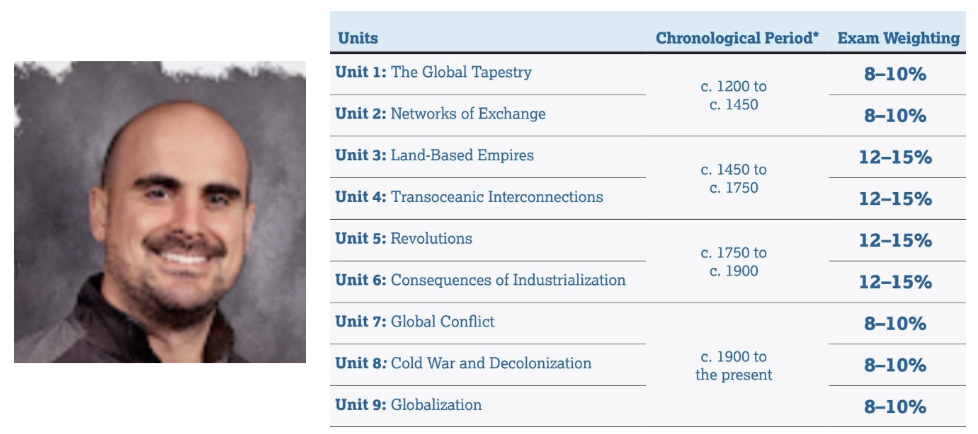
Mr. Yohannan has been a Garnet Valley High School social studies teacher for about 10 years now. Recently, however, he’s taken on something new. After teaching AP European History for the majority of his career (8 years), the school has decided to get rid of it as a course. Instead, they’ve replaced it with AP World. This is a huge change for Mr. Yohannan and his fellow Social Studies teachers. For those curious, this is what Mr. Yohannan thinks of the change.
Q: What are the classes you teach?
A: I teach AP World and Non-Western Cultures
Q: Which one is your favorite class to teach? Why?
A: I love teaching Non Western Cultures because it's often the first time 9th graders are exposed to very different cultures for the first time. That is fun to explore with them.
Q: Tell me your favorite memories from all those years teaching AP Euro.
A: I'll miss AP Euro because of some of the unique assignments the course lends itself to. For example, I used to do a funeral for Napoleon, and we also used to put Christopher Columbus on trial for genocide. These lessons were really engaging.
Q: So the school just added AP world…what are your thoughts?
A: I am excited! I think Garnet Valley is joining a national trend of trying to reframe history in a more global, balanced perspective and move away from the traditional Eurocentric model. The course seems really engaging with unique lessons and activities.
Q: Are you sad to see AP Euro go? If so, why?
A: I'm not sad, no. That was a fun and interesting course to teach, but I'm excited for the new challenge, and I think the kids will get a lot out of the switch.
Q: What plans do you have for AP World?
A: I would like to see AP World be an AP that earns a reputation for being challenging yet engaging at the same time. I'll try my best to keep it that way this year with various projects and simulations, so the course is not just essays and tests.
Q: Were you at all a part of adding this to the curriculum?
A: Yes, I was. I advocated for the switch, and many others in the department did, as well. Once we agreed it would be added, I designed the curriculum over the summer.
Q: What topics does AP World cover?
A: Topics covered include how states maintain their power, how they lose power, and how they gain it. Aside from power, the course touches on topics like economics, major world conflicts, and major belief systems.
Q: What are the students' responses to AP World?
A: So far, so good. I think I have heard more from past AP Euro students to tell me how much harder AP Euro appears to have been than AP World.
Q: What are the biggest differences between AP World and AP Euro?
A: I think the biggest difference is the emphasis on broad themes in AP World rather than extensive content knowledge in AP Euro.
Q: What are the biggest similarities between AP World and AP Euro?
A: All of the skills are the same. Just as in AP Euro, students need to know how to write a thesis statement, how to contextualize, etc. The test itself in May is structured the same way.
Q: What do you want to tell other students to try to get them interested in AP World?
A: Taking AP World will really broaden their understanding of, not just modern history, but us as a people now. The world can be a scary place sometimes, but it's also fascinating, and each one of us comes from a unique place where the story is worth telling. Take the class and learn more about those unique stories.
Q: What course would you add to the curriculum?
A: I would love to add a course about the Reconstruction Period in American History. I think it's a tremendously important part of our nation's story that often gets overlooked. There are so many fascinating events that happened during that period that are directly playing out in today's world. Without that course, today might not make that much sense.



